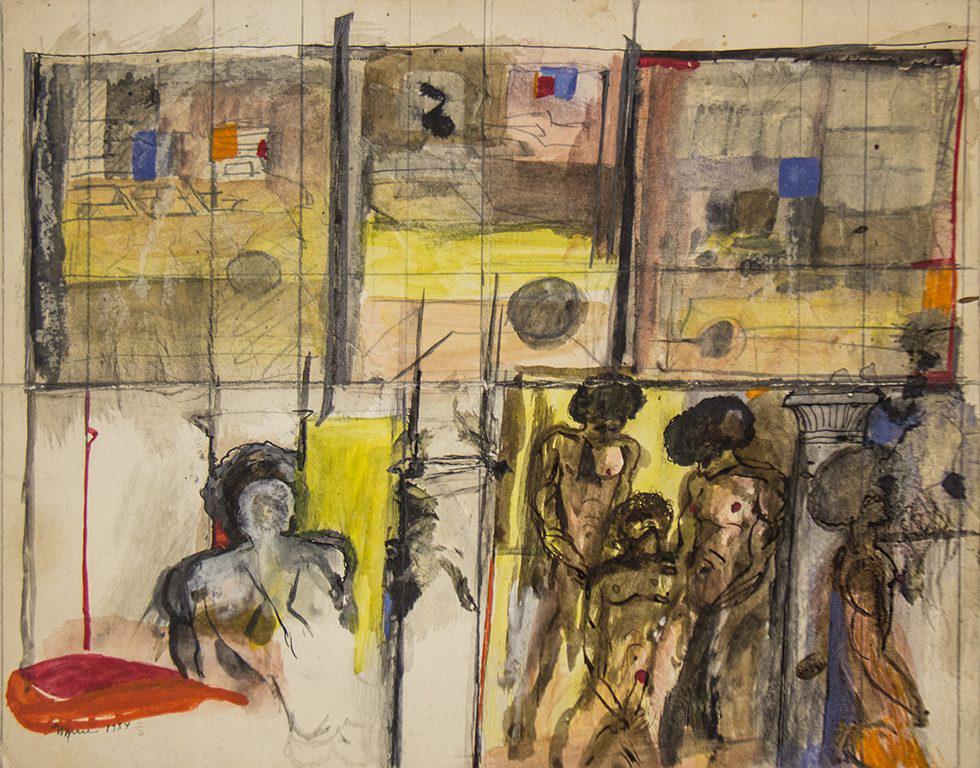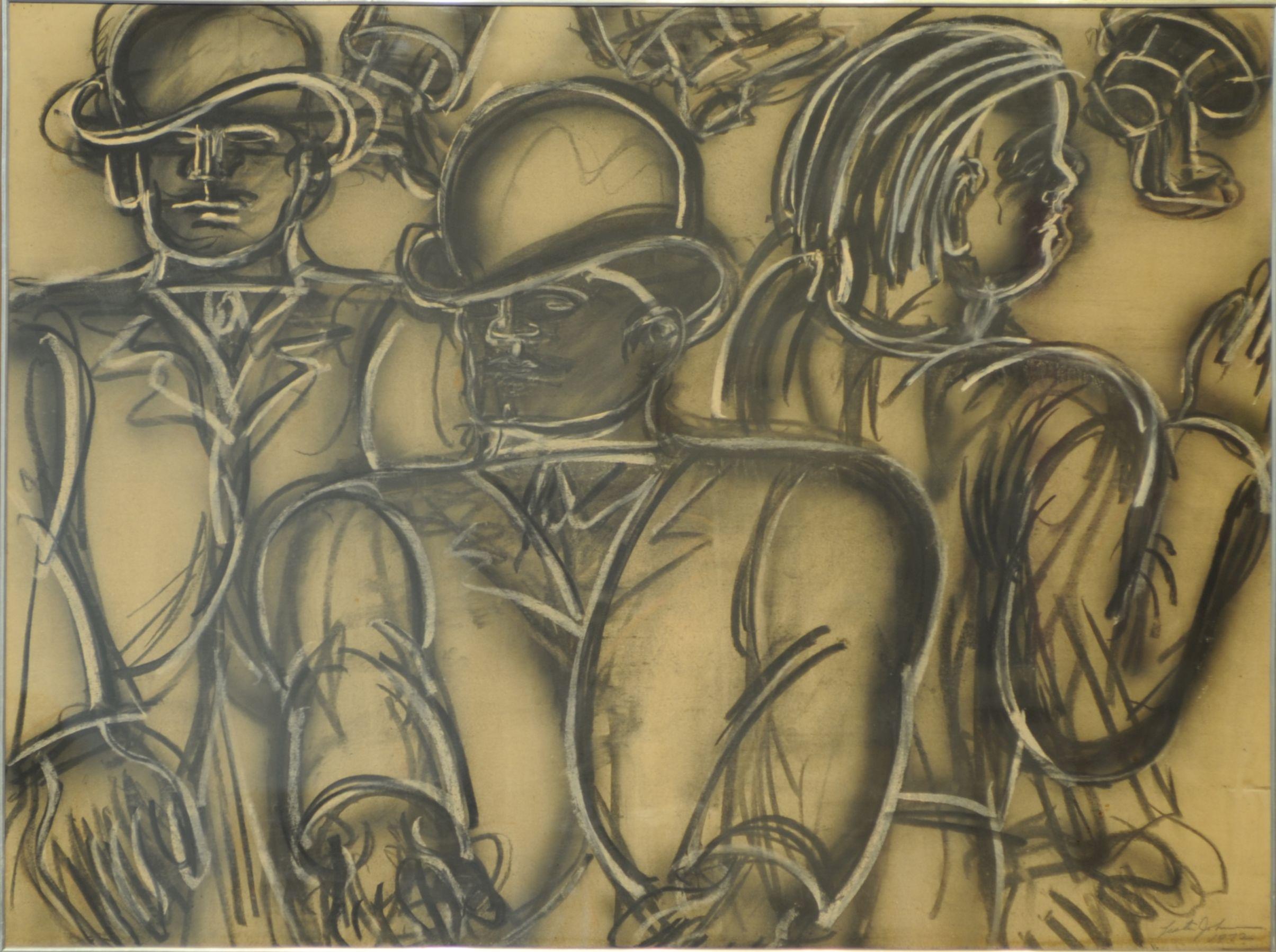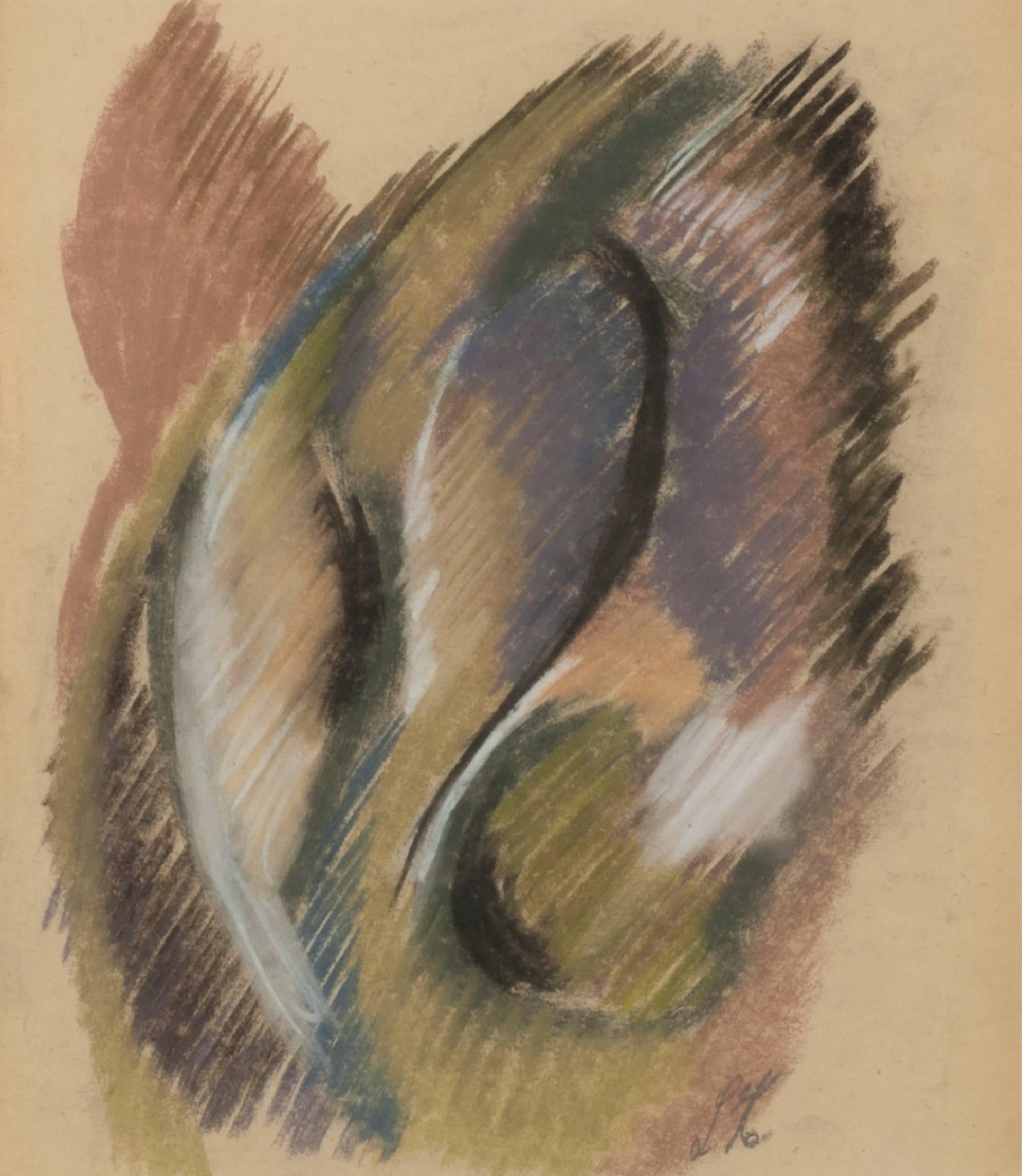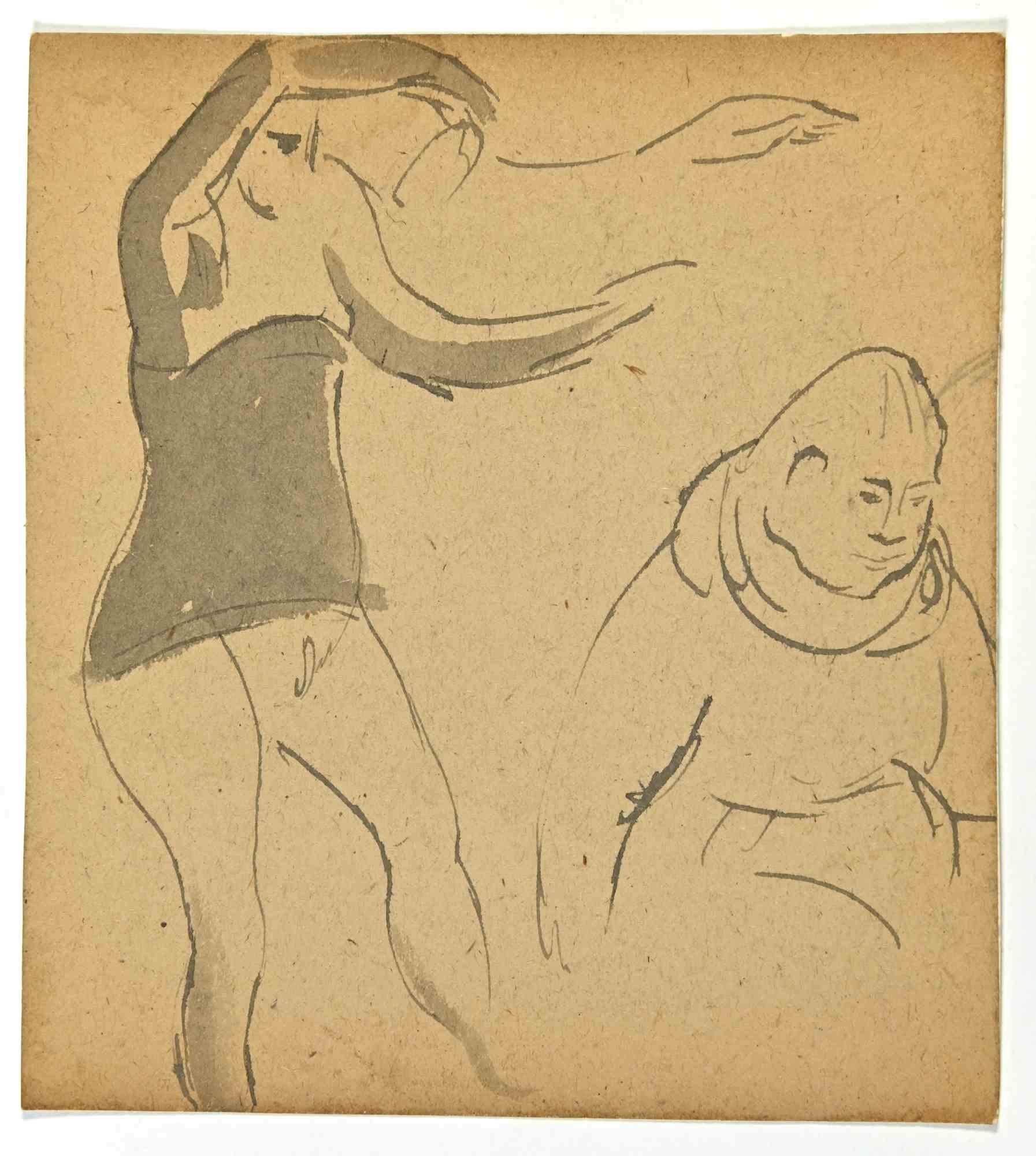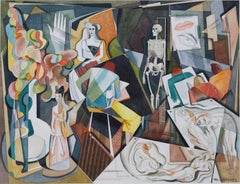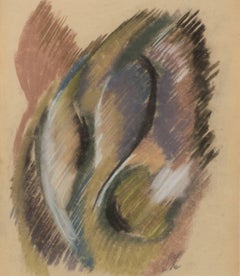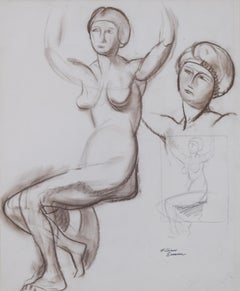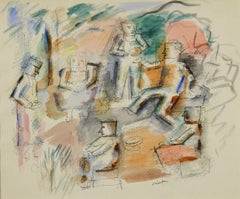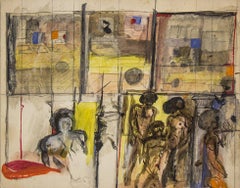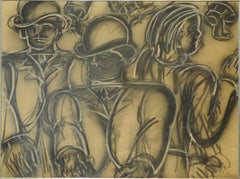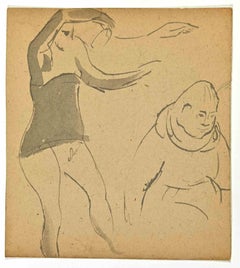Want more images or videos?
Request additional images or videos from the seller
1 of 16
Honore GuilbeauQuick Change1930-31
1930-31
$6,500
£4,908.10
€5,694.41
CA$9,134.54
A$10,177.17
CHF 5,312.96
MX$123,564.40
NOK 66,780.49
SEK 63,123.79
DKK 42,508.07
About the Item
Quick Change
Watercolor on paper, 1930-1931
Signed lower right: Honore Guilbeau
Illustrated in American Art Review, August 2014, page 84 in an article by Dr. Marianne Berardi, "The Women's Art Club of Cleveland, 1912-2006"
Note: Lithograph reproduced in photos
Provenance: Thomas French Fine Art
Max Ember, LA, CA
Exhibited: Cleveland Museum of Art, 1932
Downtown Gallery, NYC (their date stamp on reverse of sheet)
References And Exhibitions:
Illustrated in American Art Review, August 2014, page 84 in an article by Dr. Marianne Berardi, "The Women's Art Club of Cleveland, 1912-2006 (see photos)
Note: Guilbeau was employed by the Martha Graham Dance Company in the early 1930’s. A lithograph in the collection of the Cleveland Museum of Art depicts the Martha Graham Dance Company in a performance at the Missouri State Fair in Sedalia, MO. The CMA accession number is dated 1931, establishing the date and location of the series of composition that the present work is a part of. In 1932 Guilbeau exhibited at the May Show, two works entitled “Quick Change”. The lithographic version won First Prize in the May show and is according to research done by Dr. Larry Waldman, is identical to the composition of this watercolor. In May Show records, the second work exhibited is a watercolor of the same title, priced at $20. One can assume this example is indeed the watercolor exhibited in 1932. It most probably depicts a “quick change” during the performance of Herlequinade which was performed by MGDC in 1931.
Exceptional modernist work by this highly regarded Cleveland modernist. Works of hers are in the collections of Cleveland Museum of Art and the Art Institute of Chicago. She exhibited at the Philadelphia Academy, Art Institute of Chicago (prize) and the Cleveland Museum of Art (prize).
Sheet: 14 3/4 x 11 3/8";
Image: 14 1/2 x 11
- Creator:Honore Guilbeau ((1907-2006), American)
- Creation Year:1930-31
- Dimensions:Height: 19.5 in (49.53 cm)Width: 16.75 in (42.55 cm)
- Medium:
- Movement & Style:
- Period:
- Condition:Excellent, fresh colors.
- Gallery Location:Fairlawn, OH
- Reference Number:Seller: FA104631stDibs: LU14013571812
About the Seller
5.0
Recognized Seller
These prestigious sellers are industry leaders and represent the highest echelon for item quality and design.
Gold Seller
Premium sellers maintaining a 4.3+ rating and 24-hour response times
Established in 1978
1stDibs seller since 2013
808 sales on 1stDibs
Typical response time: <1 hour
Associations
International Fine Print Dealers Association
- ShippingRetrieving quote...Shipping from: Fairlawn, OH
- Return Policy
Authenticity Guarantee
In the unlikely event there’s an issue with an item’s authenticity, contact us within 1 year for a full refund. DetailsMoney-Back Guarantee
If your item is not as described, is damaged in transit, or does not arrive, contact us within 7 days for a full refund. Details24-Hour Cancellation
You have a 24-hour grace period in which to reconsider your purchase, with no questions asked.Vetted Professional Sellers
Our world-class sellers must adhere to strict standards for service and quality, maintaining the integrity of our listings.Price-Match Guarantee
If you find that a seller listed the same item for a lower price elsewhere, we’ll match it.Trusted Global Delivery
Our best-in-class carrier network provides specialized shipping options worldwide, including custom delivery.More From This Seller
View AllThe Model
By William C. Grauer
Located in Fairlawn, OH
The Model
Watercolor on paper, c. 1930
signed lower right (see photo)
Condition: Excellent
A few bits of adhesive residue verso
Colors fresh and unfaded
Housed in a Marin style meta...
Category
1930s American Modern Interior Drawings and Watercolors
Materials
Watercolor
Untitled
By Leon Kelly
Located in Fairlawn, OH
Untitled
Pastel on paper, 1922
Initialed lower right (see photo)
Exhibited: Francis Nauman, Leon Kelly: Draftsman Extraordinaire, New York, April 4 - May 23, 2014.
Condition: Excell...
Category
20th Century American Modern Abstract Drawings and Watercolors
Materials
Pastel
$4,000
Female Nude Study
By William Sommer
Located in Fairlawn, OH
Female Nude Study
Graphite and crayon on wove paper, c. 1928
Signed with the Estate stamp "B" (see photo)
Provenance: Estate of the Artist
Edward Sommer (his so...
Category
1920s American Modern Nude Drawings and Watercolors
Materials
Crayon
Interior Scene with Figures
By Louis Schanker
Located in Fairlawn, OH
Interior Scene with Figures
Ink and watercolor on paper, c. 1930's
Signed with the Estate stamp lower center
Condition: Loss upper right corner; two small tears lower margin
...
Category
1930s American Modern Drawings and Watercolor Paintings
Materials
Watercolor
Untitled
By Leon Kelly
Located in Fairlawn, OH
Untitled
Pastel on paper, 1922
Signed with the artist's initials in pencil
Provenance: Estate of the artist
Francis M. Nauman (label)
Private collection, NY
A very early abstract/cubist work by Kelly. Created while the artist was studying with Arthur Carles in Philadelphia.
Leon Kelly (October 21, 1901 – June 28, 1982) was an American artist born in Philadelphia, PA. He is most well known for his contributions to American Surrealism, but his work also encompassed styles such as Cubism, Social Realism, and Abstraction. Reclusive by nature, a character trait that became more exaggerated in the 1940s and later, Kelly's work reflects his determination not to be limited by the trends of his time. His large output of paintings is complemented by a prolific number of drawings that span his career of 50 years. Some of the collections where his work is represented are: The Metropolitan Museum in New York, The Whitney Museum of American Art, the Museum of Modern Art, the Philadelphia Museum of Art, and Boston Public Library.
Biography
Kelly was born in 1901 at home at 1533 Newkirk Street, Philadelphia, PA. He was the only child of Elizabeth (née Stevenson) and Pantaleon L. Kelly. The family resided in Philadelphia where Pantaleon and two of his cousins owned Kelly Brothers, a successful tailoring business. The prosperity of the firm enabled his father to purchase a 144-acre farm in Bucks County PA in 1902, which he named "Rural Retreat" It was here that Pantaleon took Leon to spend every weekend away from the pressures of business and from the disappointments in his failing marriage. Idyllic and peaceful memories of the farm stayed with Leon and embued his work with a love of nature that emerged later in the Lunar Series, in Return and Departure, and in the insect imagery of his Surrealist work. "If anything," he once said,"I am a Pantheist and see a spirit in everything, the grass, the rocks, everything."
At thirteen, Leon left school and began private painting lessons with Albert Jean Adolphe, a teacher at the School of Industrial Art (now the University of the Arts) in Philadelphia. He learned technique by copying the works of the old masters and visiting the Philadelphia Zoo, where he would draw animals. Drawings done in 1916 and 1917 of elephants, snakes and antelope, as well as copies of old master paintings by Holbein and Michelangelo, heralded an impressive emerging talent. In 1917, he studied sculpture with Alexander Portnoff but his studies came to an abrupt halt with the start of World War I. Being too young to enlist, he joined the Quartermaster Corp at the Army Depot in Philadelphia, where he served for more than a year loading ships with supplies and, along with other artists, working on drawings for camouflage.
By 1920, the family's fortunes drastically changed. His father's business had failed due to the introduction of ready made clothing and his marriage, unhappy from the beginning, dissolved. Broken by circumstance Pantaleon left Philadelphia to begin a wandering existence looking for work leaving Leon to support his mother and grandmother. He found a job in 1920 at the Freihofer Baking Company where he worked nights for the next four years. Under these circumstances Leon continued to develop his skills in drawing and painting and learned of the revolutionary developments in art that were taking place in Paris.
During the day he was granted permission to study anatomy at the Philadelphia School of Osteopathy where he dissected a cadaver and perfected his knowledge of the human figure. He also met and studied etching with Earl Horter, a well known illustrator, who had amassed a significant collection of modern art which included work by Brancusi, Matisse, and Cubist works by Picasso and Braque. Among the artists around Horter was Arthur Carles, a charismatic and controversial painter who taught at the Pennsylvania Academy of Fine Arts. Leon enrolled in the Academy in 1922, becoming what Carles described as, "his best student".
In the next three years Leon work ranged from academic studies of plaster casts, to pointillism, to landscapes of Fairmount Park in Philadelphia, as well as a series of pastels showing influences from Matisse to Picasso. Clearly influenced by Earl Horter's collection and Arthur Carles he mastered analytical cubism in works such as The Three Pears, 1923 and 1925 experimented with Purism in Moon Behind the Italian House. In 1925 Kelly was awarded a Cresson Scholarship and on June 14 he left for Europe.
Paris
The first trip to Europe lasted for approximately three and a half months and introduced Kelly to a culture and place where he felt he belonged. Though he returned to the Academy in the Fall, he left for Europe again a few months later to begin a four-year stay in Paris. He moved into an apartment at 19 rue Daguerre in Paris and began an existence intellectually rich but in creature comforts, very poor. "I kept a cinderblock over the drain in the kitchen sink to keep the rats out of the apartment" he once explained. He frequented the cafes making acquaintances with Henry Miller, James Joyce and the critic Félix Fénéon as well as others. His days were split between copying old master paintings in the Louvre and pursuing modernist ideas that were swirling through the work of all the artists around him. The Lake, 1926 and Interior of the Studio, 1927, now in the Newark Museum.
Patrons during this time were the police official Leon Zamaran, a collector of Courbets, Lautrecs and others, who began collecting Kelly's work. Another was Alfred Barnes of the Barnes Collection in Philadelphia.
In 1929 Kelly married a young French woman, Henriette D'Erfurth. She appears frequently in paintings and drawings done between 1928 and the early 1930s.
Philadelphia
The stock market crash of 1929 made it impossible to continue living in Paris and Kelly and Henriette returned to Philadelphia in 1930. He rented a studio on Thompson Street and began working and participating in shows in the city's galleries. Work from 1930 to 1940 showed continuing influences and experimentation with the themes and techniques acquired in Paris as well as a brief foray into Social Realism. The Little Gallery of Contemporary Art purchased the Absinthe Drinker...
Category
1920s Abstract Abstract Drawings and Watercolors
Materials
Pastel
$4,000
Untitled
By Leon Kelly
Located in Fairlawn, OH
Untitled
Pastel on paper, 1922
Initialed lower right (see photo)
Exhibited: Francis Nauman, Leon Kelly: Draftsman Extraordinaire, New York, April 4 - May 23, 2014.
Condition: excellent
Image size: 11 8 7/8 inches
Frame size: 18 1/4 x 16 1/4 inches
Provenance: Estate of the artist
The Orange Chicken...
Category
1920s Abstract Abstract Drawings and Watercolors
Materials
Pastel
$4,000
You May Also Like
Evocation 1
By Bill Rice
Located in New York, NY
Watercolor on paper
Signed, verso
This artwork is offered by ClampArt, located in New York City.
Bill Rice was considered by such luminaries as Rene Ricard to be one of the most important painters of urban life from his generation. Rice’s depictions of inner city gay men...
Category
1980s Other Art Style Figurative Drawings and Watercolors
Materials
Paper, Watercolor
Price Upon Request
untitled
By Lester Johnson
Located in New York, NY
Lester Johnson untitled charcoal, conte crayon, and spray enamel on board from 1972. Framed.
Category
1970s Other Art Style Figurative Drawings and Watercolors
Materials
Conté, Charcoal, Spray Paint, Board
$12,000 Sale Price
20% Off
Figures - Drawing - Mid-20th Century
Located in Roma, IT
Figures is a drawing realized in the Mid-20th Century.
Watercolor on paper.
Good conditions with slight foxing.
The artwork is realized through deft expressive strokes.
Category
Mid-20th Century Modern Figurative Drawings and Watercolors
Materials
Watercolor
Untitled
By David Remfry
Located in Boca Raton, FL
Whether obscured by the smoky nightclub lighting or enlivened by the strong color of the Mardi Gras dancers, David Remfry’s life-size watercolors evoke a kaleidoscope of movement. M...
Category
21st Century and Contemporary Contemporary Figurative Drawings and Water...
Materials
Watercolor, Archival Paper
$22,000
The Show is On
Located in Los Angeles, CA
The Show is On, 1940, oil on canvas, signed and dated lower right, 24 x 20 inches, exhibited: 30th Annual Exhibition of the Associated Artists of Pittsburgh, Carnegie Institute, Pitt...
Category
1940s American Modern Figurative Paintings
Materials
Canvas, Oil
"The Pose"
By Gershon Benjamin
Located in Lambertville, NJ
Jim’s of Lambertville is proud to offer this artwork by:
Gershon Benjamin (1899-1985)
An American Modernist of portraits, landscapes, still lives, and the urban scene, Gershon Benj...
Category
1940s Modern Figurative Drawings and Watercolors
Materials
Paper, Pastel

